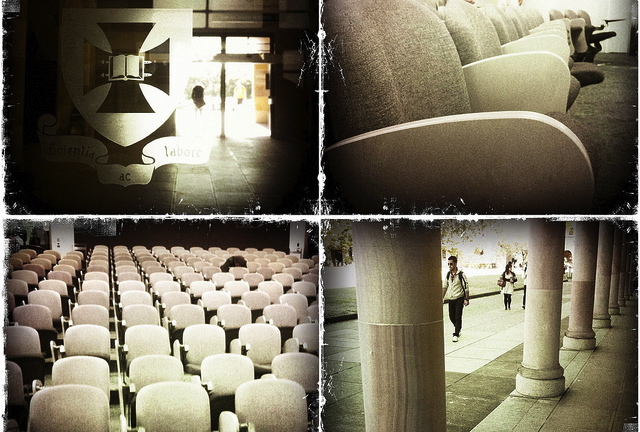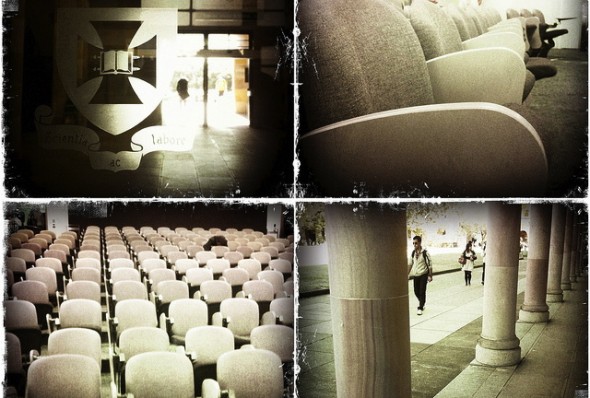
University debate resurfaces as graduates prepare for future
Debate over journalism education is as relevant as ever

The University of Queensland ranks higher than fellow Queensland institutions but debate still continues over which Journalism program reigns supreme.
Speculation over which journalism school is the front-runner has existed since universities around Australia established journalism departments in the 20th Century. With a new generation of university graduates about to descend upon the job market hoping somebody will provide them with the opportunity to get a foot in the door in the journalism industry, the debate is as relevant as ever before.
Media corporations have seen tightened budgets, increased job cuts and collapsing share prices, as well as the impending future of newspapers, calling on the next wave of journalists have to bring something revolutionary to the table.
Whether forthcoming alumni will deliver or not is determined partly by which university they have spent the last few years and thousands of dollars earning a degree in journalism from.
The year 2000, John Henningham’s address to The Univeristy of Queensland’s Academic Board described the university’s decision to merge journalism and communication, as well as public relations, as a step back in journalism education.
“The move was opposed by journalism students, teachers and industry advisers who sought to preserve the integrity and standards of professional journalism education at the university,” he said.
The professor of journalism spoke against the amalgamation and predicted the decline of journalism at The University of Queensland.
Professor Henningham was not the only one spouting criticism against the university. Students took to social networking sites, creating a blog entitled “What’s wrong with the J School”, to vent their disappointment with journalism teachings at The University of Queensland.
“Reading from an out-dated text book and being lectured by elderly, cynical academics is not going to prepare me, unfortunately. UQ needs to enter the 21st century, or the 20th at the very least, and update their teaching styles. Just because the campus is surrounded by sandstone, doesn’t mean the administration has to be just as old,” one student posted on the blog.
“It’s okay to stem away from the conservative values that UQ exudes. In fact, it’ll place us in a better position when we graduate, as opposed to leaving us bitter, wondering why we bothered wasting three, four or five years.?? All I’ve heard from people is negativity regarding UQ’s journalism degree structure, and I’ve come to realise this year that they’re right. I should have gone to QUT,” a second student posted on the blog.
The supposed heavily based theoretical teachings of journalism practice at The University of Queensland has led many to believe that similar courses at Queensland University of Technology (QUT), or even Griffith, are superior.
Dr John Harrison, program director of undergraduate journalism & communication studies at The University of Queensland says the facts prove otherwise.
Although he states that five years ago one could say that the QUT program was a better journalism program, that is no longer true.
“Evidence shows enrollments are increasing. They’re the facts, they’re the facts that come to me which are contrary to popular discourse,” he said.
“We have JACTV, we have JACDigital,” he says to those who claim journalism at The University of Queensland is not practical enough.
“Anyone who says UQ isn’t practical enough isn’t coming to class,” Dr Harrison said.
He admits that it is an enormous battle to get the univeristy to realise the need for courses in the journalism school to be focused on practice, but, having devoted the past five years of his life to make a difference, there has been some headway in convincing regulatory boards that journalism coursework needs to be constantly evolving alongside industry.
“There’s a recognition that higher education is about the brand and the UQ brand is unassailable,” Dr Harrison continues.
Even those who are highly critical of The University of Queensland don’t dispute that fact, as a third student writes on the blog “What’s wrong with the JSchool?”:
“Many persevere with the BJ at UQ purely for the name of the Uni at the top of the degree. But it is well known that UQ does not necessarily provide the most practical course. Does prestige override practicality?”
With 300 students accepted into journalism at The University of Queensland and nearly 2,000 students across journalism and communication, versus 80 at Queensland University of Technology, there is little disputing the demand for education at Australia’s largest and oldest journalism school.
Of seven Australian universities named among the world’s top 200 higher education institutions in the latest Times Higher Education World University Rankings, The University of Queensland ranked number 48, far ahead of trailing QUT at 281 and Griffith at 368.
The Federal Government’s insistence on producing measurable outcomes has made the journalism department at The University of Queensland increasingly aware that funding will increasingly depend on the meeting of a number of performance indicators.
It is constantly reminded by news media industry that there are too few job opportunities for the number of journalism trained graduates.
The Journalism Education Association Australia is currently undertaking a review of benchmarking agencies globally to assist journalism schools across Australia better prepare graduates for industry placement.
Dr John Harrison states that journalism graduates do not leave The University of Queensland without the ability to cover all aspects of journalism including text, digital, reporting, televisual and radio.
Social media expert Nicholas Carah believes a future journalist will use their time at Univeristy to think up ways for themselves of drawing on the resources they encounter to turn themselves into somebody who is capable of following technologies and trends and being adaptable.”
Today, the journalism school at The University of Queensland find themselves in a similar predicament as the crossroads of the early 21st century as the school is currently reviewing it’s course structure and content.
The University of Queensland Journalism School state they are committed to re-designing the theory and practice of journalism in the context of the challenges facing journalism in the 21st century.
Australia’s number one tertiary journalism institute is committed to continue to deliver industry prepared graduates, with both practical and theoretical knowledge, to tackle the problems and advancements the ever-changing journalistic landscape presents.
